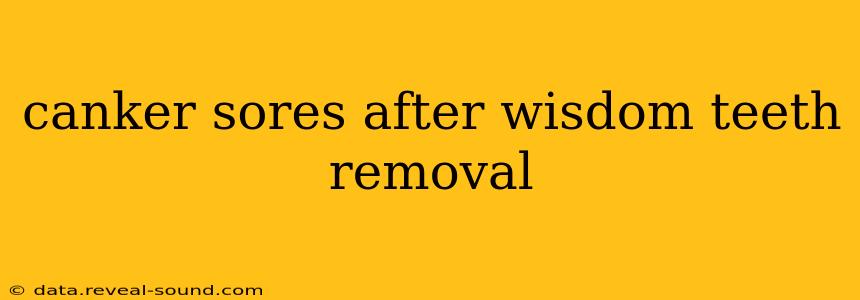Having your wisdom teeth removed is a significant oral surgery, and while the expected recovery involves swelling and pain, the appearance of canker sores can be an unwelcome surprise. This comprehensive guide explores the connection between wisdom teeth extraction and canker sores, providing insights into their causes, prevention strategies, and effective treatment options.
What Causes Canker Sores After Wisdom Teeth Removal?
The development of canker sores, also known as aphthous ulcers, after wisdom teeth removal isn't directly caused by the extraction itself. However, the surgery creates an environment conducive to their formation. Several factors contribute:
-
Trauma to the Oral Mucosa: The surgical procedure, even with meticulous technique, can cause minor trauma to the soft tissues in your mouth. This irritation can trigger the immune system, leading to canker sore development. The constant rubbing of sutures or even the act of swallowing can further exacerbate this.
-
Dry Mouth (Xerostomia): Post-surgical medications, especially pain relievers, can contribute to dry mouth. Saliva plays a crucial role in maintaining the oral microbiome and protecting against infections. A dry mouth environment increases the susceptibility to canker sores.
-
Stress: The stress associated with surgery and recovery can weaken the immune system, making you more prone to developing canker sores. Even minor anxieties can contribute.
-
Nutritional Deficiencies: While less common, deficiencies in certain vitamins and minerals, such as vitamin B12 or iron, can increase the likelihood of canker sore occurrences. Nutritional intake may be disrupted during recovery.
-
Irritation from Food: During the healing process, certain foods may irritate the already sensitive oral mucosa, triggering the formation of canker sores. Spicy, acidic, or hard foods should be avoided.
Are Canker Sores After Wisdom Teeth Removal Normal?
While not directly a complication of wisdom teeth removal, the appearance of canker sores post-surgery isn't unusual. Many individuals experience them due to the factors mentioned above. However, it's essential to differentiate between a minor canker sore and a more significant issue like an infection. If you're concerned about the size, number, or persistence of your sores, consult your dentist or oral surgeon.
How Can I Prevent Canker Sores After Wisdom Teeth Removal?
Proactive measures can significantly reduce the risk of developing canker sores post-surgery. These include:
-
Maintaining Oral Hygiene: Gentle brushing and rinsing with a prescribed antiseptic mouthwash (as directed by your surgeon) help keep the mouth clean and reduce the risk of infection and irritation. Avoid vigorous brushing near the extraction sites.
-
Hydration: Drinking plenty of water keeps your mouth moist, preventing dryness and promoting healing.
-
Diet: Eat soft, bland foods that are easy to chew and won't irritate the sores. Avoid acidic, spicy, and hard foods. Ensure adequate intake of nutrient-rich foods.
-
Stress Management: Practice stress-reducing techniques like deep breathing exercises or meditation.
-
Avoid Smoking and Alcohol: Both smoking and alcohol can hinder healing and increase the risk of infection.
How Long Do Canker Sores Last After Wisdom Teeth Removal?
The duration of canker sores varies. Most heal within 7-10 days. However, factors such as size, location, and individual healing rates influence recovery time. If your sores persist beyond two weeks, consult your dentist.
What Treatments Are Available for Canker Sores After Wisdom Teeth Removal?
Several effective treatments can alleviate discomfort and promote healing:
-
Over-the-counter pain relievers: Ibuprofen or acetaminophen can help manage pain.
-
Topical anesthetics: These can numb the area and provide temporary relief. Many are available without a prescription.
-
Rinsing with salt water: A warm salt water rinse can help clean the area and soothe irritation.
-
Prescription medications: In some cases, your dentist may prescribe stronger pain relievers or topical corticosteroids to accelerate healing.
Can I Use Mouthwash After Wisdom Teeth Removal?
Yes, but only as directed by your dentist or oral surgeon. They will recommend an appropriate mouthwash that won't interfere with the healing process. Avoid alcohol-based mouthwashes as they can be irritating.
When Should I See a Dentist About Canker Sores After Wisdom Teeth Removal?
Consult your dentist or oral surgeon if:
- Canker sores are unusually large or painful.
- Sores persist for more than two weeks.
- You experience signs of infection (e.g., increased pain, swelling, fever).
- You have difficulty swallowing or opening your mouth.
By understanding the causes, prevention strategies, and treatment options for canker sores after wisdom teeth removal, you can manage this common post-surgical experience and ensure a smoother recovery. Remember to always consult your dentist or oral surgeon for personalized advice and treatment.
